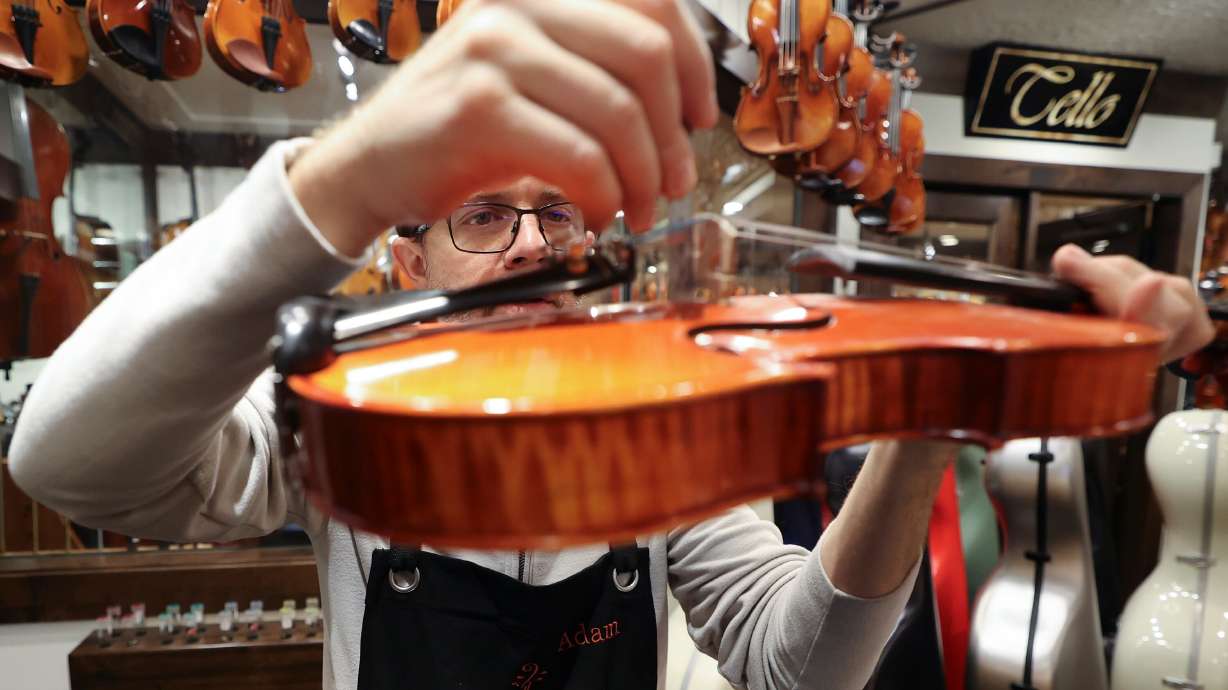Estimated read time: 4-5 minutes
- Adam Day Violins in Murray specializes in handcrafted, old-world string instruments.
- He has produced nearly 7,000 violins.
- Endorsed by musicians like Joshua Bell, Day's violins range in value up to $24,000.
SALT LAKE CITY — The lights are on in the shop where Adam Day and his band of violin-makers ply their craft. But if the lights weren't on? No worries. They'd still have a job.
The whole technological infrastructure could collapse, the industrial revolution could have never happened, and there would still be a place for luthiers, i.e. craftsmen who build or repair stringed instruments the old-world way: by hand.
"The joke around here is that we work in the kind of place where Napoleon is new news," says Day, the founder and owner of Adam Day Violins, indulging in a bit of luthier humor.
The name actually comes from the lute, a 15th century French instrument that looks like a bloated banjo. People who made lutes were called luthiers. When the violin, viola, bass and cello came along, luthier became a catch-all for the artisans who shaped them.
"It's not everyone's career choice," deadpans Day. "When you tell someone what you do, it's always, 'Really?' What? That's a thing?'"
But it's his career choice, and to him, it's a dream job. Quite literally.
Day was 14 years old when his violin teacher, Kelly Richardson, told him he'd had a dream about Day making violins.
"I came to my violin lesson one day," Day recalls, "and he said he'd had this dream and it was so vivid he thought maybe I ought to look into it."

That was 32 years ago. With the exception of a two-year break for a Latter-day Saint mission to Chile, Adam has been honing his craft as a luthier ever since. First came the better part of a decade learning and relearning the basics from world-renowned Utah luthier Paul Hart.
That was followed by the founding of his shop a little over 25 years ago in December 2000.
Sometime this summer, Adam Day Violins (adamdayviolins.com) will produce its 7,000th instrument.

Headquarters for all this artisanship is on State Street in the heart of Murray. Adam's violin-making shop is tucked in behind Day Murray Music, a business that doesn't quite date back to Napoleon but, nonetheless, is one of the oldest businesses in Murray.
Adam Day's grandparents, Arlette and John Day, opened the music store just after the end of World War II, in 1949, selling sheet music, record players, vinyl records and refrigerators. Today, Adam Day's parents, Clint and Rosanne Day, along with his brother Jared Day, manage the store.
They still sell all things music, including a prodigious amount of sheet music, but no refrigerators.

The pace slows noticeably when you walk the few steps from the retail store to Day's violin shop. Suddenly, you're in a sanctuary of wooden instruments, with a window to watch the luthiers as they make or build up the violins, violas, cellos and basses that will replace the ones being sold.
Prices range from just a few hundred dollars to $24,000. That's the price for a custom-made Adam Day violin.

Day says it takes 200 hours for him to make a violin from scratch, and that's if the tone sounds right when he plays it. If not, it's back to the drawing board trying to figure out why.
"Even though the time spent making it dictates that it should be a $20,000 violin, if the tone quality isn't up to speed, it's not going to sell for that," says Day. "So I have to find out why. Maybe I have to take off the top and thin it down to be more resonant, just to give an example."
Having a keen musical ear is one of three main attributes Day says a luthier needs to be successful. The other two are an artistic eye — because a violin is also a work of art — and good hand-eye coordination.

"You have to have the hands of a surgeon, really, because all of the measurements and all the fits are so precise," says Day.
It also doesn't hurt to have other musicians love what you make.
Day's career got a jump start in the beginning when Joshua Bell, one of America's foremost violinists, a Grammy-award winner no less, played two of Day's first three custom violins and gave them his unqualified endorsement.
"He was one of the first individuals who made me feel like I had a future in violin making," says Day. Many others have followed suit. His website (adamdayviolins.com) is crowded with endorsements from professional musicians.

He doesn't regret not going the traditional college route when it seemed everyone was telling him that was what he needed to do.
"'You'll never make a living this way, you need to go to college and get your degree' — I got told that a lot," says Day. "I think it's sad when people say you have to jump through certain hoops to be successful because that's not what I experienced."
He is quick to add, "It's a miracle, this whole business I get to do is a miracle to me."
And he doesn't need computers to do it. Or electricity, for that matter.









